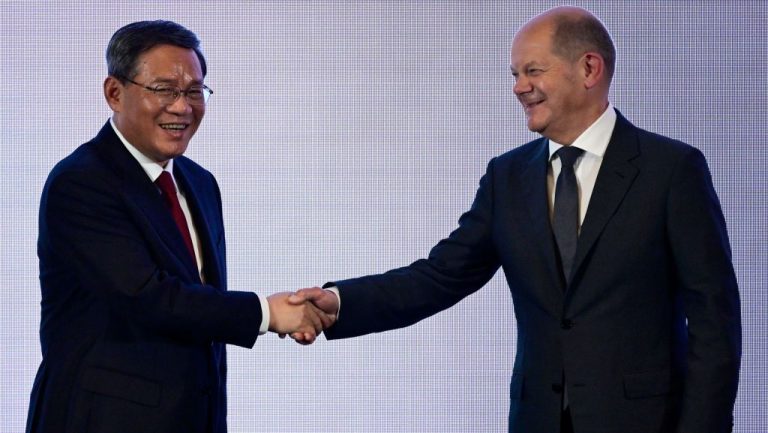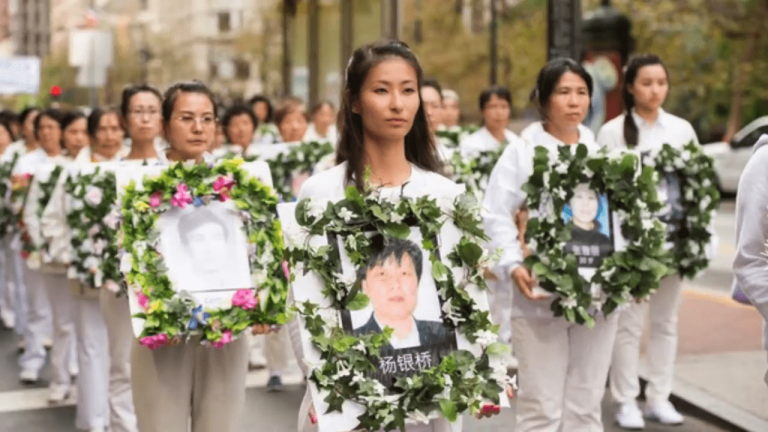Chinese premier Li Qiang has been received by German Chancellor Olaf Scholz in his first trip outside of the country since succeeding former Premier Li Keqiang after President Xi Jinping was awarded his third term as leader of China and the Communist Party.
Associated Press reported on June 19 that Li’s trip will also involve a stop in France and was framed as coming at a time that “Europe and Germany consider how best to handle an increasingly assertive China.”
Scholz was quoted as stating that the G7, of which Germany is a member, “has no interest in impeding China’s economic rise,” but added that “at the same time we are looking closely to avoid dangerous economic dependencies.”
Al Jazeera noted on the Scholz-Li rendezvous that it’s only the seventh time that Germany and China have met on high level diplomatic grounds, an event that came just a day after U.S. Secretary of State Antony Blinken traveled to the Mainland to meet with Xi.
Chinese Communist Party (CCP) messaging outlet Xinhua framed the trip as one where Li called on Scholz to bring “more cooperation” in a number of fields, specifically carbon climate change and green energy.
Success
You are now signed up for our newsletter
Success
Check your email to complete sign up
Al Jazeera noted the meeting had an official motto of “acting sustainably together.”
In reporting on the meeting by German-language outlet Welt, Scholz was quoted as emphasizing, “We have no interest in economic decoupling from China” during a press conference.
Scholz was also quoted as stating that “China has a very special task here” in regards to its seat on the United Nations Security Council, adding that in regards to China’s position as a G20 member, “We should work well together on this,” in reference to the matter of the Ukraine War.
Scholz told the presser that it is “important that China does not continue to supply weapons to the aggressor Russia.”
South China Morning Post emphasized the same aspect of the meeting in its reporting on the topic, stating that Scholz told Li to “exert even greater influence” on Moscow.
The Post stated that Li neither commented on Russia, nor were questions from reporters permitted at the event.
The tip-toeing between the CCP and the rest of the world is encapsulated in the recent emergence of the term “de-risking.”
The Brookings Institute summarized the notion in a May 30 article, stating it originated with the European Union’s officials and references a vague policy line involving “protecting a narrow set of advanced technologies critical for our national security,” a quote issued by U.S. President Joe Biden at the G7 Summit.
The concept—and how it differs from “decoupling”—made its own headlines amid Premier Li’s trip.
Financial Times reported on June 19 that CEO of U.S. Military Industrial Complex cornerstone Raytheon, Greg Hayes, admitted during an interview with the outlet, “We can de-risk but not decouple.”
Hayes said his firm has “several thousand suppliers in China and decoupling . . . is impossible,” specifically noting the Mainland’s near-monopoly on rare earth minerals, crucial to a wide array of modern technologies used in many sectors.
The backdrop to the diplomatic event between Germany and China was somewhat tense during its June 13 announcement. Politico reported, based on comments from undeclared German officials, that the Scholz administration had requested Li’s entourage be composed of only a few ministers.
When Li Keqiang met with Angela Merkel in 2018, the previous time top officials of the two countries met, China brought 20 ministers, it stated.
“The German government is keen to avoid giving the impression that it’s receiving China with all-too-open arms amid tensions over Taiwan and Beijing’s not-so-indirect support for Russia’s war in Ukraine — especially to EU partners, the U.S. and Japan,” Politico said as it summarized information received from three of its sources.
In May, the Xi leadership abruptly canceled a scheduled meeting where German Finance Minister Christian Lindner was set to travel to Beijing to meet with his counterpart, Liu Kun, at the last moment, Euractiv reported.
The Chinese side officially stated the cause was “scheduling reasons,” but did not elaborate in its comments to German media.
It may have been retaliation for an instance in March where Bettina Stark-Watzinger, German Education and Research Minister, visited Taiwan, marking the first time a German minister had set foot in the Republic in 26 years, Focus Taiwan reported.
The cause may be more notable than conjecture.
The official U.S. State Department transcript of a speech by Secretary Blinken during his trip to Beijing directly said, “We do not support Taiwan independence.”
“On Taiwan, I reiterated the longstanding U.S. ‘one China’ policy. That policy has not changed,” Blinken also said.
Despite the amicable overtone to the German meetings, tensions between globalist countries and the Mainland are still hot behind the curtain.
FT also noted in June 17 reporting on the leadup to Li’s arrival that the Scholz administration had approved “its first-ever national security strategy” just days prior, which called China a “increasingly aggressively claiming regional supremacy” that is “repeatedly acting in contradiction to our interests and values.”
Meetings between the Chinese government and foreign counterparties have assembled a flurry of activity in recent weeks.
In late May, Tesla CEO and Twitter owner Elon Musk was received by Foreign Minister Qin Gang after making a to-the-public unscheduled trip to Beijing, that also involved a visit to the Tesla Gigafactory located in Shanghai.
The trip came just days after JP Morgan CEO Jamie Dimon visited China for the first time since before the COVID-19 pandemic, and was accompanied by the CEOs of Starbucks and Pfizer.
Dimon’s trip also involved remote attendance by former Secretary of State Condoleezza Rice and the now-100-year-old Henry Kissinger.













